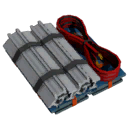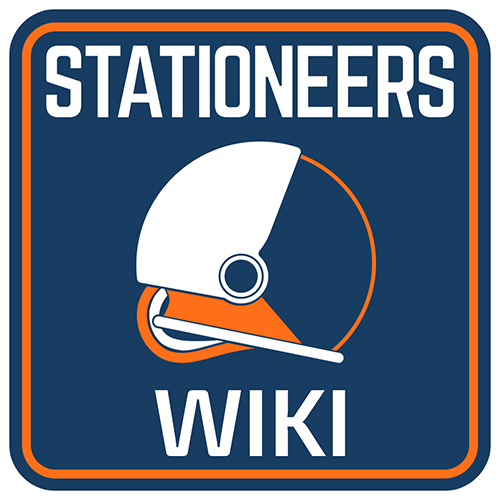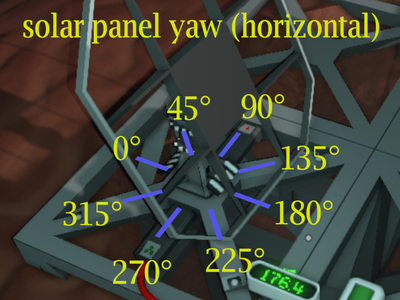Solar Panel
From Unofficial Stationeers Wiki
(Redirected from Solar Panel (Angled))
 | |
| Stacks | 5 |
|---|---|
| Constructing Options | Solar Panel (Flat), Solar Panel (Angled) |
| Recipe | |
| Created With | Electronics Printer |
| Cost | 10g Iron, 2g Gold, 10g Copper |
| Prefab Hash | 844961456 |
| Prefab Name | ItemKitSolarPanelBasic |
 | |
| Stacks | 5 |
|---|---|
| Constructing Options | Solar Panel (Dual), Solar Panel |
| Recipe | |
| Created With | Electronics Printer |
| Cost | 5g Gold, 20g Copper, 15g Steel |
| Prefab Hash | -1924492105 |
| Prefab Name | ItemKitSolarPanel |
 | |
| Stacks | 5 |
|---|---|
| Constructing Options | Solar Panel (Heavy Flat), Solar Panel (Heavy Angled) |
| Recipe | |
| Created With | Electronics Printer (Tier Two) |
| Cost | 10g Copper, 10g Steel, 2g Electrum, 10g Invar |
| Prefab Hash | -528695432 |
| Prefab Name | x |
 | |
| Stacks | 5 |
|---|---|
| Constructing Options | Solar Panel (Heavy Dual), Solar Panel (Heavy) |
| Recipe | |
| Created With | Electronics Printer (Tier Two) |
| Cost | 20g Copper, 10g Steel, 5g Electrum, 15g Astroloy |
| Prefab Hash | -364868685 |
| Prefab Name | x |
| Operation | |
|---|---|
| Power Usage | 0W to 500W generated |
| Prefab Hash | -2045627372 |
| Prefab Name | StructureSolarPanel |
| Construction | |
| Placed with | Kit (Solar Panel) |
| Placed on | Large Grid |
| Stage 1 | |
| Next Stage Construction | |
| Constructed with item | Glass Sheet |
| Deconstruction | |
| Deconstructed with | Hand Drill |
| Item received | Kit (Solar Panel) |
| Stage 2 | |
| Deconstruction | |
| Deconstructed with | Crowbar |
| Item received | Glass Sheet |
| Operation | |
|---|---|
| Power Usage | 0W to 500W generated |
| Prefab Hash | -539224550 |
| Prefab Name | StructureSolarPanelDual |
| Construction | |
| Placed with | Kit (Solar Panel) |
| Placed on | Large Grid |
| Stage 1 | |
| Next Stage Construction | |
| Constructed with item | Glass Sheet |
| Deconstruction | |
| Deconstructed with | Hand Drill |
| Item received | Kit (Solar Panel) |
| Stage 2 | |
| Deconstruction | |
| Deconstructed with | Crowbar |
| Item received | Glass Sheet |
Contents
Description[edit]
The Solar Panel generates power by absorbing sunlight, depending on solar intensity, up to 500W per panel on the moon. Can be manually rotated using a Wrench. Can be built in two configurations, one with opposite side split power/data ports, or two with same side combined power/data ports.
Data ports can interact with Daylight Sensors and logic i/o writers or batch writers to automatically rotate the panel to face the sun.
At the extreme attitude settings (0/100) the solar panel still faces 15 degrees above the horizon. Thus the total arc of vertical rotation is only 150 degrees from input values 0-100.
Can also be destroyed by storms, or left with very little health. Best course of action is to remove the solar panels when you are notified of a storm by a Weather Station, Which allows you to replace them once the storm is over.
They can be repaired with Duct Tape, or by dissembling them and reassembling them. You could even cover them with windows to protect them from storms at the cost of some efficiency of the panels themselves being lost. And Heavy Solar Panels are a more expensive version that do not take storm damage but it is debatable if its worth making the tier 2 metal Astroloy to prevent storm damage whilst retaining maximum efficiency.
Types of Solar Panel Kit[edit]
There are 4 kinds of Solar Panel Kits:
- Basic Solar Panels are the cheapest, but don't have logic inputs so they can not be set up to automatically track the sun. They're useful early on when resources are limited and power needs are lower, but they spend most of their time at reduced power output.
- Standard Solar Panels have logic inputs and can be programmed to track the sun for optimal power output.
- Heavy Solar Panels are protected against storm damage, but more expensive and require a Tier Two Electronics Printer. Note that not all planets have storms.
- Basic Heavy Solar Panels are just a combination of the Basic and Heavy solar panel properties.
Positioning[edit]
Pay close attention to the positioning of your solar panel since their automation will depend heavily on it. Most user-made scripts and guides orient the panels with the data port facing sunset and the power port facing sunrise.
Notes[edit]
After placement be sure to install one Glass Sheet to make it functional.
See Sensors and Solar_Logic_Circuits_Guide for panel automation using logic circuits.
Power output of a single Solar Panel on different planets[edit]
| World | Solar Energy | % of Earth | Solar Angle |
|---|---|---|---|
| Moon | 500W | 100% | 0° |
| Mars | 455W | 91% | 8° |
| Europa | 210W | 42% | 32° |
| Mimas | 90W | 18% | 126° |
| Asteroid belt | 500W | 100% | 0° |
| Loulan | 455W | 91% | 8° |
| Vulcan | 750W | 150% | 48° |
| Venus | 500W | 100% | 0° |
Data Network Properties[edit]
These are all Data Network properties of this device.
Data Parameters[edit]
These are all parameters, that can be written to with a Logic Writer, Batch Writer, or Integrated Circuit (IC10). The outputs are listed in the order a Logic Writer's "VAR" setting cycles through them.
| Parameter Name | Data Type | Description |
|---|---|---|
| Horizontal | Degrees | Set the horizontal rotation of the Solar Panel (clockwise, 0-360°, data port is at 270°) |
| Vertical | Degrees | Sets the vertical angle of the Solar Panel (As of at least version 0.2.3263.16264, solar panels accept input in degrees above the horizon instead of in percent, so the solar panels travel between inputs of 15 and 165, with 90 being straight up. Previously, this was supposedly a Percentage "accepting 0-100% which translates to 15°-165°, 50%=90° =zenith") |
| On | Boolean | Turns the solar panel on or off |
Data Outputs[edit]
These are all parameters, that can be read with a Logic Reader or a Slot Reader. The outputs are listed in the order a Logic Reader's "VAR" setting cycles through them.
| Output Name | Data Type | Description |
|---|---|---|
| Charge | W | Returns the power generated in Watts |
| Horizontal | degrees | Returns the horizontal rotation of the Solar Panel |
| Vertical | % | Returns the vertical angle of the Solar Panel |
| Maximum | W | Maximum possible power for this planet |
| Ratio | How close to maximum current performance is, 1.0 means panel is perfectly directed and unobstructed | |
| On | Boolean | Returns the on/off state of the solar panel |

